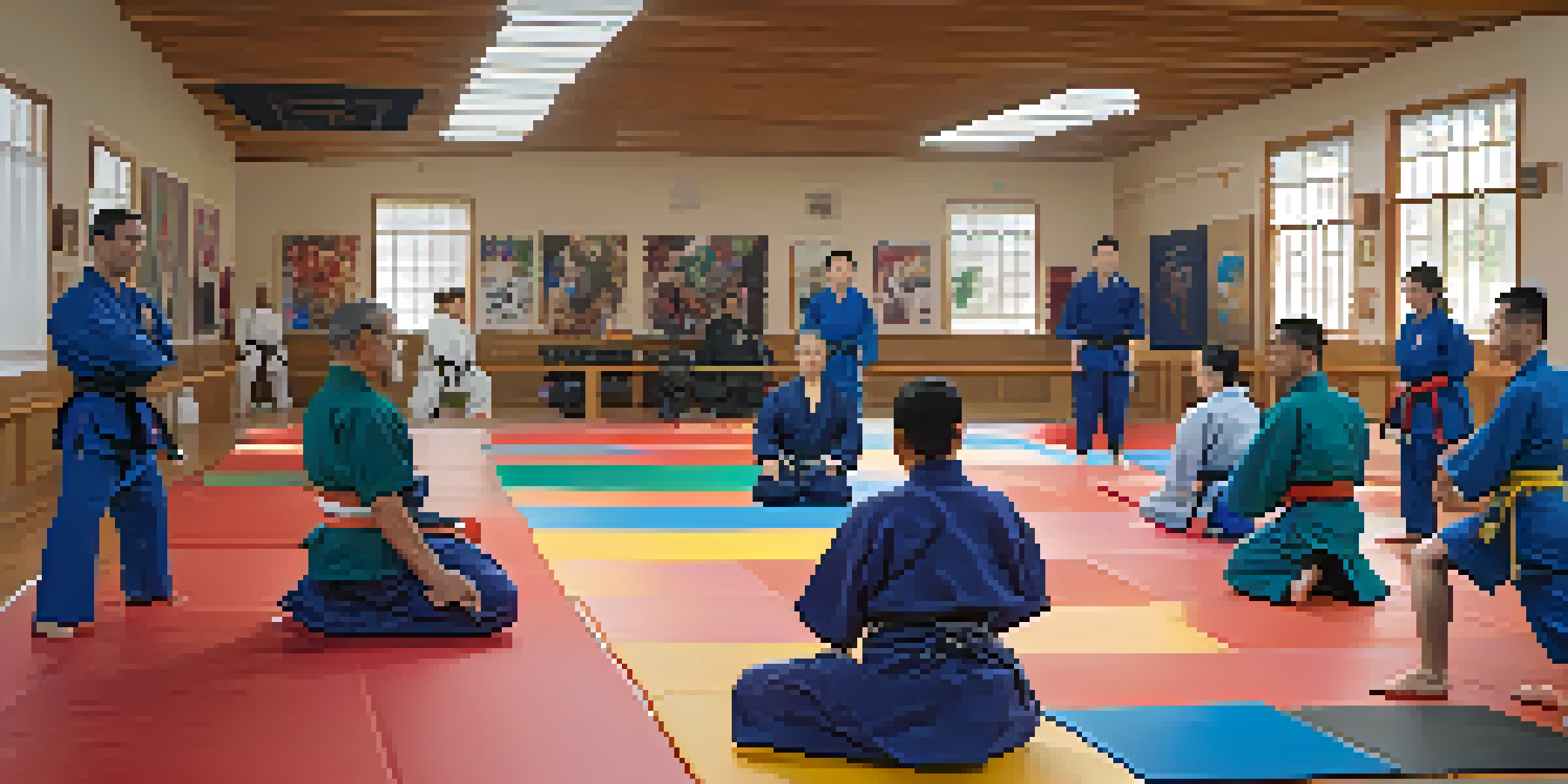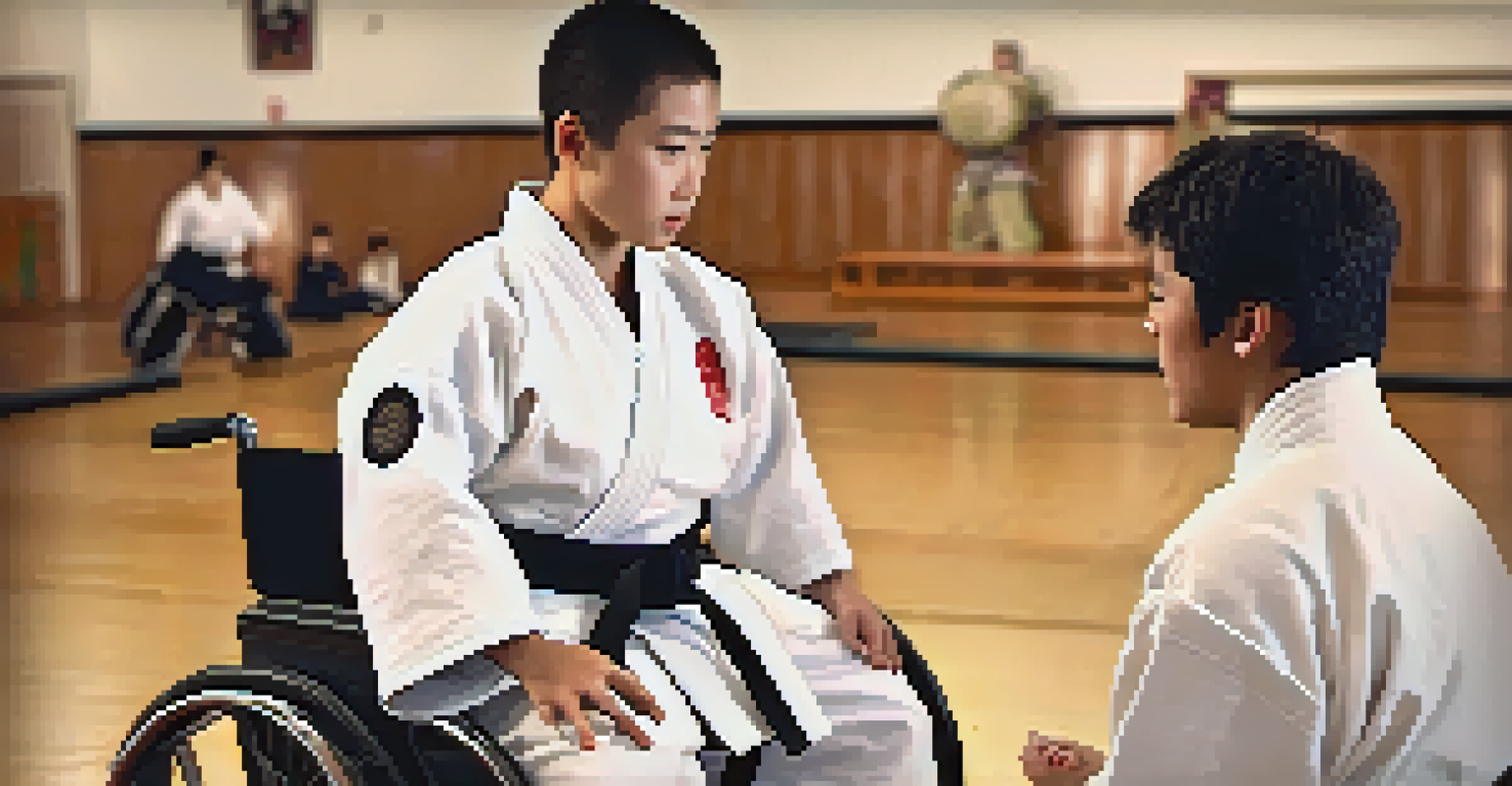Inclusive Martial Arts: Adapting Techniques for All Abilities

Understanding Inclusive Martial Arts and Its Importance
Inclusive martial arts focuses on creating an environment where practitioners of all abilities can participate and thrive. This approach not only fosters physical fitness but also promotes self-esteem and social interaction. The essence of inclusivity lies in recognizing that everyone has unique strengths and challenges, making martial arts accessible to all.
The greatest gift you can give someone is your time and attention.
For many, martial arts can be intimidating, especially for those with disabilities or varying physical abilities. However, adapting techniques and training styles can turn this perception around. When martial arts schools prioritize inclusivity, they create welcoming spaces where everyone feels valued and motivated to learn.
Moreover, inclusive martial arts can challenge societal perceptions about disabilities. By showcasing the skills and determination of diverse practitioners, these programs encourage a broader understanding of what it means to be capable. This shift in mindset not only benefits individuals but enriches the entire martial arts community.
Adapting Techniques: Finding What Works for Everyone
Adapting techniques is at the heart of inclusive martial arts. Instructors often modify movements to accommodate different abilities, ensuring that no one feels left out. For instance, a kick that might be too challenging for some can be simplified or replaced with a hand movement, allowing everyone to engage on their terms.

It's not just about physical adaptations; it's also about altering the training environment. Using mats, supportive equipment, or even adjusting class sizes can make a significant difference. Creating a safe and comfortable space encourages participants to explore their capabilities without fear of injury or embarrassment.
Inclusive Martial Arts Benefits All
Inclusive martial arts fosters physical fitness, self-esteem, and social interaction for practitioners of all abilities.
Furthermore, instructors are encouraged to develop personalized training plans. By assessing each student's strengths and limitations, they can tailor their approach and foster a sense of achievement. This individual focus can lead to greater confidence and a deeper appreciation for the art of martial arts.
Building a Supportive Community in Martial Arts
Community is essential in any martial arts program, and inclusivity amplifies this aspect. When participants share their unique experiences and challenges, they create strong bonds that transcend abilities. This support network helps individuals feel more connected and empowered, making their martial arts journey more fulfilling.
Strength does not come from physical capacity. It comes from an indomitable will.
Encouraging teamwork is another vital element of building community. Partner drills or group exercises can promote collaboration among practitioners. When students work together, they learn from one another, fostering empathy and understanding, which enriches the overall experience.
Additionally, celebrating achievements—big or small—can boost morale and motivation. Acknowledging progress in a supportive community inspires individuals to push their limits and continue striving for improvement. This sense of belonging can transform the martial arts journey into a source of joy and personal growth.
The Role of Instructors in Inclusive Martial Arts
Instructors play a crucial role in making martial arts inclusive and adaptable. Their willingness to learn about different abilities and to adjust their teaching methods can significantly impact students' experiences. A knowledgeable instructor can recognize the potential in every student and help them reach their goals.
Training instructors in inclusive practices is essential for creating a welcoming environment. Workshops and resources can equip them with the necessary skills to adapt techniques and foster understanding. By investing in instructor development, martial arts schools can ensure that inclusivity is woven into the fabric of their programs.
Adaptation is Key to Inclusivity
Adapting techniques and training environments ensures that everyone can participate and thrive in martial arts.
Moreover, instructors should be approachable and open to feedback. When students feel comfortable sharing their needs or concerns, it leads to a more effective and personalized learning experience. This ongoing dialogue between instructors and students can enhance the quality of training and support inclusivity.
Success Stories: Inspiring Examples of Inclusive Martial Arts
Inspiring success stories abound in the world of inclusive martial arts. Many practitioners have overcome significant challenges to achieve their goals, showcasing the power of adaptability and support. These narratives not only motivate others but also highlight the impact of inclusive practices on individual lives.
For example, a student with a physical disability might find joy and confidence in learning self-defense techniques that were specifically tailored for them. Their journey can inspire peers and instructors alike, demonstrating that with the right modifications, everyone can experience the benefits of martial arts.
Sharing these success stories within the broader community can help raise awareness about the importance of inclusivity. It encourages martial arts schools to adopt similar practices and motivates others to join in. By amplifying these voices, we can create a more inclusive culture that celebrates diversity and resilience.
Benefits of Inclusive Martial Arts for All Participants
Participating in inclusive martial arts offers numerous benefits for everyone involved. For individuals with disabilities, it provides an opportunity for physical activity, social interaction, and personal growth. These benefits extend beyond the dojo, positively influencing their daily lives and overall well-being.
On the other hand, able-bodied participants also gain valuable insights from engaging with their diverse peers. They learn about empathy, adaptability, and the importance of inclusivity. This exposure can foster a greater understanding of different perspectives and contribute to personal development.
Community Enhances the Experience
Building a supportive community in martial arts encourages collaboration, empathy, and personal growth among participants.
Moreover, the sense of community that develops in inclusive martial arts settings can be life-changing. Participants often form deep connections that encourage support and friendship. This camaraderie not only enriches their martial arts journey but also enhances their social lives outside the dojo.
Creating a Future of Inclusivity in Martial Arts
The future of martial arts lies in its ability to embrace inclusivity wholeheartedly. As more schools recognize the importance of adapting techniques for all abilities, the martial arts community can become a beacon of support and empowerment. The ongoing commitment to inclusivity will serve as a foundation for future generations.
To build this future, it's essential to continue raising awareness about the benefits of inclusive practices. Workshops, forums, and community outreach can help spread the word and inspire more schools to adopt these principles. When inclusive martial arts becomes the norm, everyone can experience the joy of training together.

Ultimately, creating a future of inclusivity is a collective effort. By working together—students, instructors, and the community—we can ensure that martial arts remains a platform for empowerment, respect, and unity. In doing so, we can truly celebrate the spirit of martial arts, where everyone is welcome.